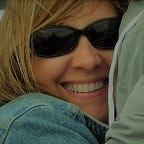How Minimalism Freed Me
The more I delve into minimalism, the more I see what it means to be free.
I never intended to be a minimalist. I never even knew what minimalism was until I had a brain injury.
2011, One Year After My Accident:
I paced the house like an angry lion, uncertain about what to do. With the inability to work, cook, or clean, and no longer being able to read, write, or think straight, I felt a kitten in a forest. Lost and confused.
Around each piece of furniture, I twirled on the carpet, following the imprints I’d made earlier that day. Through the living room, dining room, into the study, and up the stairs. Past bedroom, laundry, and bath. Repeat. Then doing it again. Until I noticed a door at the end of the hall.
I stopped.
The door was closed. I tried to remember what lay behind that door, but my mind was blank, as if someone had shaken my head and erased the memory away.
I slowly stepped towards the door, took a deep breath, and with trembling fingers, turned the knob. I gasped and clutched my chest. I could barely breathe.
It was a kaleidoscope of colors. Denims and silks and cottons strewn over chairs. Threads in greens, pinks, turquoise, and lavender. Hole punches, leather, paints and colored canvases. Brushes, journals, notebooks, pencils, and pens.
Three desks were evenly placed across the room, a blue and pink tiffany lamp on one, a simple brown office lamp on another. Lacy white ribbons, polka-dotted bows. Yarns and needles, pearls and beads, wires and string. A shelf stretching floor to ceiling held plastic shoebox bins. At the far end of the room was a simple table with a sewing machine on one end.
This was the room where I had created. Where all my business plans would come true. I looked at my shaking hands, my fingers all crooked and bent, and knew it was a dream that never would be. Even if I wanted to, my brain no longer had the ability.
Tears streamed down my face as I closed the door behind me. But even as I walked away, something inside me had changed.
I couldn’t forget that room.
I had forgotten a lot since the accident. Couldn’t remember a grandchild’s birth or a son’s wedding. I didn’t remember words, mixed-up the names of items often, couldn’t repeat a sentence someone would tell me. Didn’t watch movies because each word would too quickly slip away. But that craft room, it stuck inside my head.
A few days later, I took a large plastic bag and dragged it to the room. Picking up a soft piece of yellow-flowered cotton, I rubbed it against my face, imagining what it might have been. I smiled at the thought, then tossed the material in the bag. Piece after piece, I threw it all away, then placed it in the garbage.
My head felt lighter, almost as if I might be able to think.
The next day I brought another bag into the room, tossing dyes, canvases, and paint-crusted brushes.
Day after day, a bag was thrown away. And with every bag that left the house, I began to change.
My stuttering improved. I could slowly remember a few things. And one day, I even watched a portion of a movie.
Soon, the room was empty, except for the sewing machine which I gave away.
I looked at the room, all barren and clean. It felt free. It felt like me.
I never knew what a hold my stuff had on me.
All the things I owned and treasured, all I thought I had wanted to be, were taking up a place inside of me. When I let go of stuff, it let go of me.
I cried that day, not for what I lost, but for what I gained. I had finally found me.
I turned to the rest of our house, tossing books, old DVDs, worn-out shoes. Letting go of clothing no longer worn. Then I turned to my husband and said,
“I think it’s time we moved.”
We packed our belongings and moved across town, and my husband started minimizing, too. Christmas ornaments, pictures never placed on a wall. Fans, saws, dirty old brooms.
$10,000 worth of stuff we didn’t use.
Our house was simple and clean, the way it should be. It wasn’t that we didn’t own anything, but what we had, we loved. Movies and books that made us smile, a drawer of family portraits, pictures hung on a wall. Boots and sandals on our closet floor.
My brain became clearer. My mind unencumbered by belongings and stuff.
This was the life I had needed. This is what minimalism was.
It’s been nine years since my accident, eight since the day I started clearing my life, and setting my mind and body free. I still find myself letting go of what I don’t need. And the more I do, the more I feel a release. I can breathe.
Minimalism helped me be the best I can be.
Minimalism isn’t about owning less. It’s about being free.
